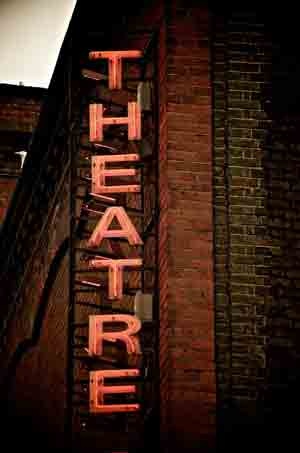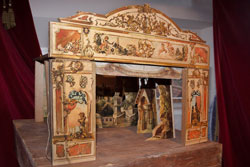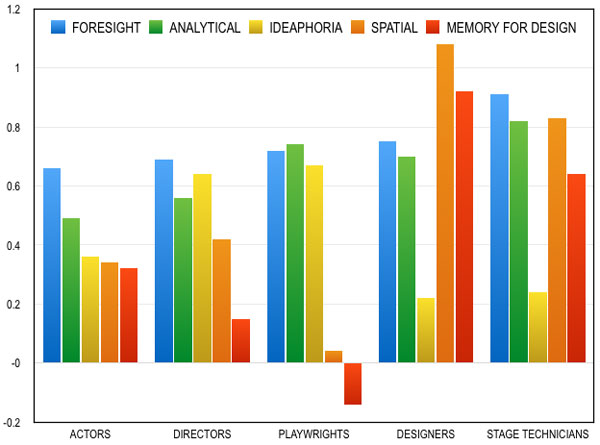
Career fields form their own worlds—the world of medicine, the world of finance—and within them there are dozens if not hundreds of occupations playing separate roles. We recently completed a study of the world of theatre and found some very interesting results. A playwright and former test administrator in our Chicago office, S. Thomasin Barsotti, undertook this study with the assistance of Dr. Linda Houser-Marko.
The majority of participants were active in the Chicago theatre industry, while three were from Atlanta. Participants were asked to identify their primary role within the professional theatre community: there were 46 actors, 28 directors, 16 playwrights, 15 designers, 10 stage technicians, 11 who categorized themselves as “other,” and 6 who did not categorize themselves.
Initial Hypotheses
We thought that theatre artists would score high in the verbal abilities (Silograms, English Vocabulary, Ideaphoria) and the musical abilities (Tonal Memory, Pitch Discrimination, Rhythm Memory), and score possibly high in spatial thinking. We also thought:
- Directors and designers might score higher than average in spatial thinking as their work often considers movement through space, or filling a space
- Playwrights might score highest among theatre artists on the English vocabulary tests and Ideaphoria
- Actors might score high on Ideaphoria, as they often need to be skilled at verbal improvisation
Ideaphoria, a divergent thinking measure, is thought to be useful in generating ideas and maintaining fluency in communication, among other things; it is commonly found among journalists, schoolteachers, and professionals in creative fields such as advertising and public relations. Directors and playwrights obtained the highest Ideaphoria scores among the theatre artists. We hypothesized that actors would score high, but they did not score significantly higher than the Foundation population, possibly because their primary job is to speak the words the playwright wrote, not generate their own lines.
Results
The theatre artists as a whole scored higher than our general testing population on many of our aptitude tests: Ideaphoria, Foresight, Analytical Reasoning, Number Series, Paper Folding, Tonal Memory, Pitch Discrimination, Rhythm Memory, Silograms, and English Vocabulary.

Designers and stage technicians scored very similarly to the actors, directors, and playwrights on the tests of Foresight and Analytical Reasoning, but stood apart on the tests of Structural Visualization (Wiggly Block and Paper Folding), Memory for Design, Observation, and Color Discrimination. These are generally attributes of those in the visual arts, particularly three-dimensional arts such architecture or interior design. Aptitudes for visual arts certainly make a great deal of sense for these two sub-groups, who build the sets and set the scenes.

Foresight
Another divergent thinking measure, Foresight, stands out most for all the theatre artists. It can be is useful in helping them to see and think of many possibilities, and to generate many ideas. Playwrights would use it in imagining characters, plots, and themes, and, in the case of adaptations to the stage from other media, may find it helpful in seeing how to transform the story into a new form. Directors use it while exploring concepts for a production in order to realize the time and place of the play, or in re-envisioning a classic text. Designers probably use it in everything they do; they, as visual artists, must take raw materials and imbue them with meaning and expression. Actors might use it in considering various readings of a character, scene, or line, or in imagining backstory and situations outside the play that could inform their character’s choices. Those in stage and production management, may find that Foresight helps in seeing the big picture of the theatrical project as a long- term series of processes, problems, and competing deadlines: any Artistic Director will thank his or her lucky stars for a production manager who foresees problems before they arise, and has a plan for dealing with them.
In another look at the study, S. Thomasin Barsotti wrote an article for HowlRound, a knowledge commons by and for theatre artists.
















